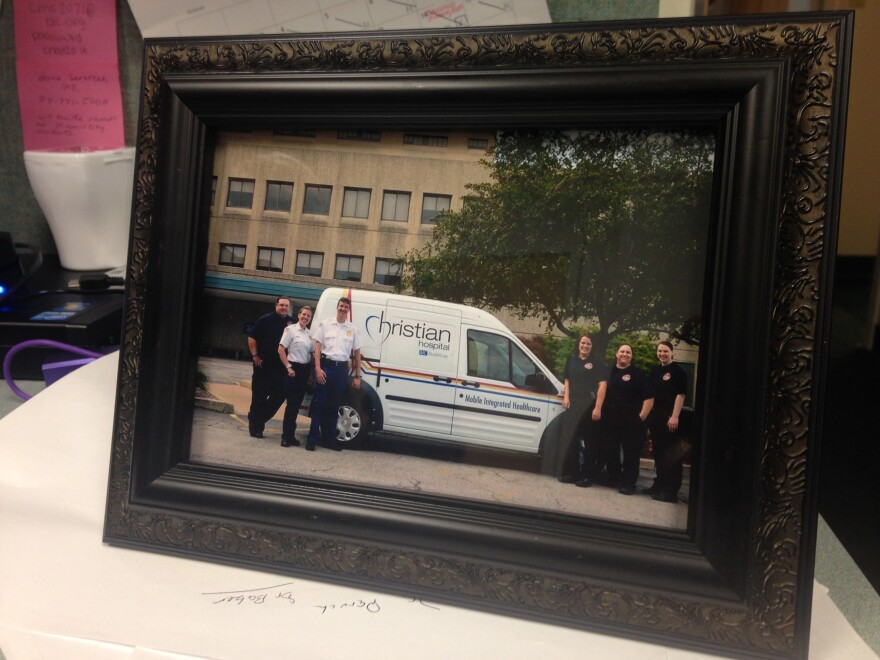There are no sirens or flashing lights as Katie Eisenbeis, a 26-year-old paramedic from Christian Hospital, parks her medical van on a tree-lined street in Ferguson. This is a house call.
Her patient, Linda Parks, 65, has had a rough year. Complications from a surgery in October left her nauseous and dehydrated, and she lost weight rapidly. Every few weeks, she’d find herself in the hospital again.
“They’d put IV fluids in me, get me eating and everything back to normal, and released me to go home. I’d come home another three weeks, I was back in the hospital again,” Parks said. Although she is insured through Medicare, her bills from the emergency room started to pile up.
At the time, Parks fit the definition of a hospital “super-user;” a colloquial term for the small number of patients who use emergency services as often as once a month. If a patient is uninsured, the cost of these visits is often absorbed by the hospital. Often, high use is due to a patient’s unmanaged medical conditions -- physical or mental -- or a lack of access to preventive care.
An internal study of Christian Hospital’s emergency system in 2013 showed that 22 patients accounted for more than 600 ER visits in an eight month period. Officials also determined that only half of the year’s ER admissions had not involved “genuine emergencies.”
In response, the BJC-affiliated hospital in north St. Louis County tried a different approach. They trained a group of paramedics to deliver house calls, and directed case workers to help the patients manage their own medical needs.
For Parks, the paramedics started by visiting her twice a day to give her intravenous fluids. Over the next few months, those appointments became less frequent as she grew stronger.

“I was ready to book it. You’re at that point where you don’t want to eat. You’ve lost so much weight. But the girls come so often, they’re friendly and they have good attitudes,” Parks said. “You see the light at the end of the tunnel.”

In August, Parks graduated from the program, swapping out visits from paramedics like Eisenbeis with regular appointments at an outpatient center. She said she’s back to her usual hobbies: working in her yard, cooking and playing Call of Duty on her Xbox.
Only a small percentage of patients use the emergency room as frequently as a “super-user.” But figuring out why they keep getting admitted and helping them avoid it ends up saving a significant amount of healthcare costs. The hospital’s own study of 18 patients in the program saved $132,580 dollars over the course of six months. They estimate that the full program has helped 7,000 people since they started in 2014, although not all cases were as severe as those who were tracked for the pilot study.
“I think it’s a fault in our healthcare system,” Eisenbeis said as she drove the medical van back to the hospital after Parks’ visit.

“Earlier we visited a patient, and she said her doctor is only allowed to spend 15 or 20 minutes with them. The office manager is on the doctor constantly: ‘Only 20 minutes, no more, no less,’” Eisenbeis said.
Eisenbeis and her colleagues don’t have those limits. They get to know their patients, meet their families and pet their dogs. When a patient can’t get hold of their family doctor on the phone, they call Eisenbeis on her cell phone. If they have a chronic medical condition, it’s Eisenbeis who teaches them how to manage it.
“We sit there, we explain, 'Hey, you have diabetes. You need to watch how much sugar you eat, the carbs, you need to take your blood sugar, you need to have a snack at night so you don’t bottom up,’” Eisenbeis said. “You need to explain these things to these people.”
But the program doesn’t stop at medical care. Resource coordinators at Christian Hospital help patients sign up for health insurance, schedule appointments with primary care doctors and access other social services.

The program does reach outside the scope of most hospital care, but hospitals now have a greater incentive to do this. Part of the Affordable Care Act includes penalties for hospitals that have too many readmissions -- patients who come back to the hospital with the same medical problem. But Jennifer Cordia, vice president of patient care at Christian Hospital, said the program is also the right thing to do.
“It’s one of those instances where if we don’t do it, who is going to do it? Somebody has to start doing something to make a difference,” Cordia said.
While other hospitals nationally have community paramedic programs, the program at Christian Hospital is a first for the St. Louis region. Soon, Cordia said, they’ll be going into two other Missouri hospitals—one rural, one sub-rural—to help them implement their own programs.
For more health and science news from St. Louis, follow Durrie on Twitter: @durrieB.
An earlier version of this story incorrectly stated that the pilot study showed a savings of $130,000 to Christian Hospital. Because the patients were insured by Medicare, the savings benefited their insurer, not the hospital. In addition, the savings were over the course of six months, not a year.



